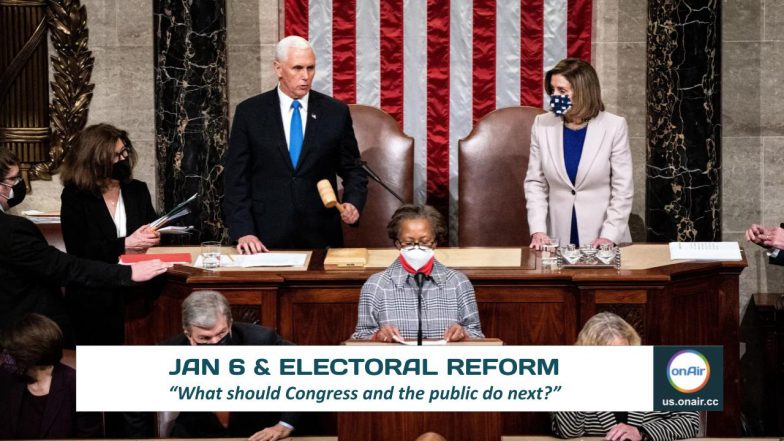News
June 30, 2022 – 12:00 pm (ET)
Moderator: Connor Oatman, US onAir – connor.oatman@onair.cc
Aircaster: Ben Murphy, US onAir – ben.murphy@onair.cc
Featured Guest: Jim Lillard, Director Democracy onAir
Student Guests: Ani Prakash, and Joe Kubicki … students at George Mason University
Our panelists will discuss the Jan 6 hearings and the implications for the current Electoral Count Act. They will seek common ground on what Congress and the public can do especially the Electoral Count Reform Act being proposed by the Senate.
For more information:Jan 6 & Electoral Reform- “What should Congress and the public do next?”
A bipartisan group of lawmakers on Capitol Hill have agreed on a framework to reform the Electoral Count Act. It governs the way Congress counts and certifies Electoral College votes during the presidential election, and it has become the subject of scrutiny after the Jan. 6 attack on the Capitol. Lisa Desjardins joins Judy Woodruff to explain
People across the political spectrum (including a majority of voters) agree that the United States’ process for electing presidents is flawed. The rules meant to ensure peaceful transitions of power are unnecessarily vulnerable to misunderstanding or worse. Events on and around Jan. 6, 2021, including attempts to disrupt the final stage of the presidential election, brought into stark relief the extent to which unclear and untested law can create space for confusion and chaos. Fortunately, members of Congress of both parties have recognized this problem. To solve it, they are now working on reforming the statute that governs the casting and counting of electoral votes for president and vice president every four years.
The Electoral Count Act of 1887 (ECA) suffers from a number of now well-documented problems, stemming largely from vague and antiquated language. But the basic intent behind the statute—including the allocation of authority and responsibility between state and federal actors—remains as relevant today as when the statute was drafted in response to the fiercely contested Hayes-Tilden election of 1876. Following that election, Congress was presented with competing submissions of electoral votes from several states and had no rules or procedures in place to determine which votes it should count. The ECA was meant to fill that gap. But it left a number of questions either unresolved or answered by labyrinthine language. (For an explanation of the history behind the law and its ambiguities, read this explainer by the National Task Force on Election Crises.)
As momentum in favor of updating the ECA grows, there is some concern that Congress may shy away from comprehensive reform and instead tackle only the most obvious flaws in the law. That would be a missed opportunity. Congress can and should remain faithful to the original purpose of the statute (and the Constitution) while also remedying dangerous weaknesses in the ECA that invite uncertainty as to the various roles that state and federal actors, as well as the different branches of government, play in the process. It can do so by addressing five key aspects of the law on which there seems to be a fair amount of consensus across the ideological spectrum.
1. The Electoral Count Act of 1887 was adopted in response to the contested presidential election of 1876, in which several states submitted competing slates of electors. It was intended to clarify rules for determining which slates to count.
2. Both parties have raised objections to electoral vote slates in recent years.
3. Some scholars believe the Electoral Count Act is unconstitutional.
4. Election law experts from across the political spectrum have endorsed reform.
5. Senators from both parties have expressed openness to reforming the Act.
To learn more about the Select Committee to Investigate the January 6th Attack on the United States Capitol, the seven June 2022 hearings, and the committee members, go to this category slider.


